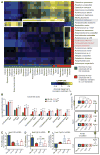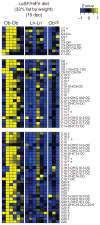Gut microbiota from twins discordant for obesity modulate metabolism in mice
- PMID: 24009397
- PMCID: PMC3829625
- DOI: 10.1126/science.1241214
Gut microbiota from twins discordant for obesity modulate metabolism in mice
Abstract
The role of specific gut microbes in shaping body composition remains unclear. We transplanted fecal microbiota from adult female twin pairs discordant for obesity into germ-free mice fed low-fat mouse chow, as well as diets representing different levels of saturated fat and fruit and vegetable consumption typical of the U.S. diet. Increased total body and fat mass, as well as obesity-associated metabolic phenotypes, were transmissible with uncultured fecal communities and with their corresponding fecal bacterial culture collections. Cohousing mice harboring an obese twin's microbiota (Ob) with mice containing the lean co-twin's microbiota (Ln) prevented the development of increased body mass and obesity-associated metabolic phenotypes in Ob cage mates. Rescue correlated with invasion of specific members of Bacteroidetes from the Ln microbiota into Ob microbiota and was diet-dependent. These findings reveal transmissible, rapid, and modifiable effects of diet-by-microbiota interactions.
Figures






Comment in
-
Microbiology. Fighting obesity with bacteria.Science. 2013 Sep 6;341(6150):1069-70. doi: 10.1126/science.1243787. Science. 2013. PMID: 24009379 No abstract available.
-
Slimming down via the microbiota.Nat Med. 2013 Nov;19(11):1374-5. doi: 10.1038/nm.3398. Nat Med. 2013. PMID: 24202385 No abstract available.
References
Publication types
MeSH terms
Associated data
- Actions
Grants and funding
- K01 DK095774/DK/NIDDK NIH HHS/United States
- K05 AA017688/AA/NIAAA NIH HHS/United States
- HHMI/Howard Hughes Medical Institute/United States
- P30-AG028716/AG/NIA NIH HHS/United States
- DK078669/DK/NIDDK NIH HHS/United States
- R01 DK076729/DK/NIDDK NIH HHS/United States
- DK70977/DK/NIDDK NIH HHS/United States
- T32 GM142607/GM/NIGMS NIH HHS/United States
- F32 DK091044/DK/NIDDK NIH HHS/United States
- P01 DK078669/DK/NIDDK NIH HHS/United States
- DK58398/DK/NIDDK NIH HHS/United States
- R01 DK070977/DK/NIDDK NIH HHS/United States
- T32 GM008759/GM/NIGMS NIH HHS/United States
- P30 DK056341/DK/NIDDK NIH HHS/United States
- P01 DK058398/DK/NIDDK NIH HHS/United States
- P30 AG028716/AG/NIA NIH HHS/United States
- P30 DK020579/DK/NIDDK NIH HHS/United States
LinkOut - more resources
Full Text Sources
Other Literature Sources
Medical
Molecular Biology Databases
Miscellaneous

